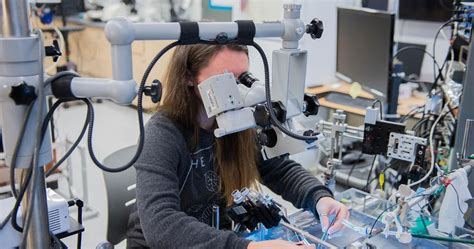NJIT Biomedical Engineering’s Impact on the Healthcare Landscape

New Jersey Institute of Technology (NJIT) is a pioneer in the field of biomedical engineering, consistently ranking among the top institutions for its research and educational programs. With a commitment to advancing healthcare through transformative technologies, NJIT is shaping the future of medicine.
Research Excellence and Innovation
NJIT’s biomedical engineering research is renowned for its interdisciplinary approach, combining expertise from engineering, science, and medicine. The university’s researchers are actively engaged in developing innovative solutions to pressing healthcare challenges, including:
- Biomaterials Engineering: Designing and manufacturing materials that are biocompatible and suitable for implant use.
- Biomedical Imaging: Developing advanced imaging techniques to visualize biological processes at a cellular level.
- Computational Biology: Using computational tools to analyze and interpret biological data.
- Tissue Engineering and Regenerative Medicine: Advancing the creation of engineered tissues and organs for transplantation.
- Rehabilitation Engineering: Designing devices and therapies to restore function to individuals with disabilities.
Educational Programs that Prepare Future Leaders
NJIT’s biomedical engineering educational programs are designed to equip students with the skills and knowledge needed to succeed in the dynamic healthcare industry. The university offers undergraduate and graduate degrees in:
- Biomedical Engineering: A comprehensive program that combines engineering principles with biological knowledge.
- Pre-Med/Pre-Health: A pathway for students aspiring to careers in medicine or other healthcare professions.
- Biomedical Engineering Technology: A hands-on program that prepares students for technical roles in the field.
Industry Partnerships and Real-World Impact
NJIT collaborates with leading healthcare institutions and industry partners to translate research discoveries into real-world applications. The university’s Center for Applied Biomedical Engineering provides a hub for collaboration, fostering the development of innovative medical technologies.
The Future of Healthcare: A NJIT Vision
Looking ahead, NJIT’s biomedical engineering program is poised to continue making significant contributions to healthcare advancement. Researchers are exploring cutting-edge technologies such as:
- Nanotechnology: Utilizing nanomaterials for targeted drug delivery and diagnostics.
- Wearable Technologies: Developing sensors and devices that monitor health metrics in real-time.
- Artificial Intelligence (AI): Integrating AI into healthcare systems to improve diagnosis, treatment planning, and patient outcomes.
Quotes from Industry Leaders
“NJIT’s biomedical engineering program is a vital resource for the healthcare industry. Their graduates possess the technical expertise and innovative thinking needed to drive the future of medicine.” – CEO, major medical device company
“NJIT’s research in biomaterials engineering has transformed the design of implants and prosthetics, improving the lives of countless patients.” – Chief of Surgery, renowned hospital
- NJIT is ranked #66 among US institutions for biomedical engineering research by the National Science Foundation (NSF).
- Over $10 million in external funding is secured annually for biomedical engineering research.
- 95% of biomedical engineering graduates are employed or pursuing further education within six months of graduation.
- The Center for Applied Biomedical Engineering has facilitated over 200 partnerships with industry and clinical institutions.
“Bio-hacking” is an emerging field that combines biology, engineering, and technology to create innovative solutions to healthcare challenges. This concept encourages individuals to experiment with their own bodies and health data to identify and develop new applications for biomedical devices and therapies.
Table 1: Potential Bio-Hacking Applications
| Area | Application |
|---|---|
| Personal Health Monitoring | Wearable biosensors, implantable monitoring devices |
| Disease Prevention | Early detection tools, genetic screening |
| Personalized Medicines | Tailored treatments based on individual health profiles |
| Lifestyle Optimization | Biofeedback, fitness trackers for health improvement |
Table 2: Biomedical Engineering Research Projects
| Project | Description | Funding |
|---|---|---|
| 3D Printing of Tissue Scaffolds | Developing biocompatible scaffolds for tissue regeneration | $1.5 million |
| AI-Assisted Diagnosis of Cancer | Using machine learning to improve cancer detection accuracy | $2 million |
| Nanomaterials for Drug Delivery | Designing nanoparticles for targeted and controlled release of drugs | $1 million |
Table 3: Biomedical Engineering Educational Programs
| Program | Duration | Degree |
|---|---|---|
| Biomedical Engineering (Undergraduate) | 4 years | B.S. in Biomedical Engineering |
| Biomedical Engineering (Graduate) | 2 years | M.S. in Biomedical Engineering |
| Biomedical Engineering Technology (Undergraduate) | 2 years | A.A.S. in Biomedical Engineering Technology |
Table 4: Industry Collaborations
| Company | Collaboration Area |
|---|---|
| Johnson & Johnson | Biomaterials for medical implants |
| Philips | Biomedical imaging technologies |
| Roche | Computational biology for drug discovery |
- Engage in hands-on projects: Get involved in research labs or design challenges to gain practical experience.
- Attend industry conferences: Network with professionals and learn about emerging technologies.
- Stay updated on research: Read scientific journals and follow research groups on social media.
- Collaborate with clinicians: Understand the clinical needs and challenges to inform your research and designs.
- Think outside the box: Explore interdisciplinary approaches and unconventional ideas to drive innovation.
Conclusion
NJIT’s biomedical engineering program is a driving force in the advancement of healthcare. Through its cutting-edge research, innovative educational programs, and industry collaborations, NJIT empowers students and researchers to make a tangible impact on the lives of patients worldwide. As the future of healthcare unfolds, NJIT’s commitment to innovation will continue to shape the way we prevent, diagnose, and treat diseases.
